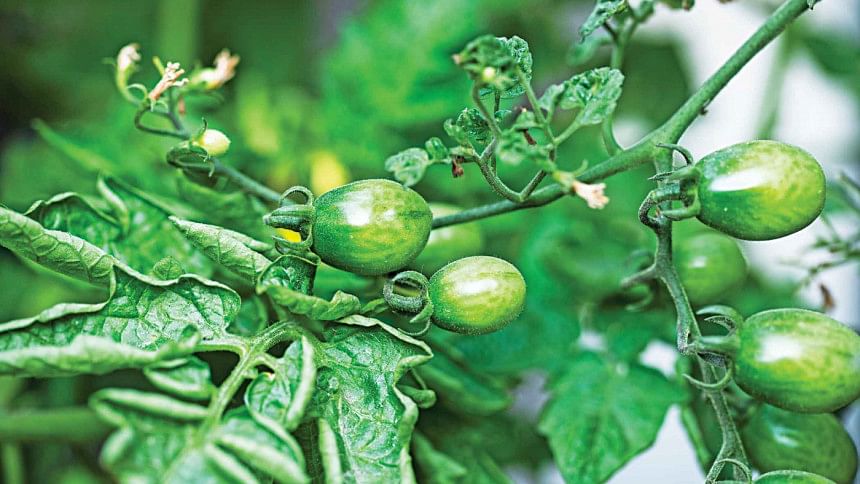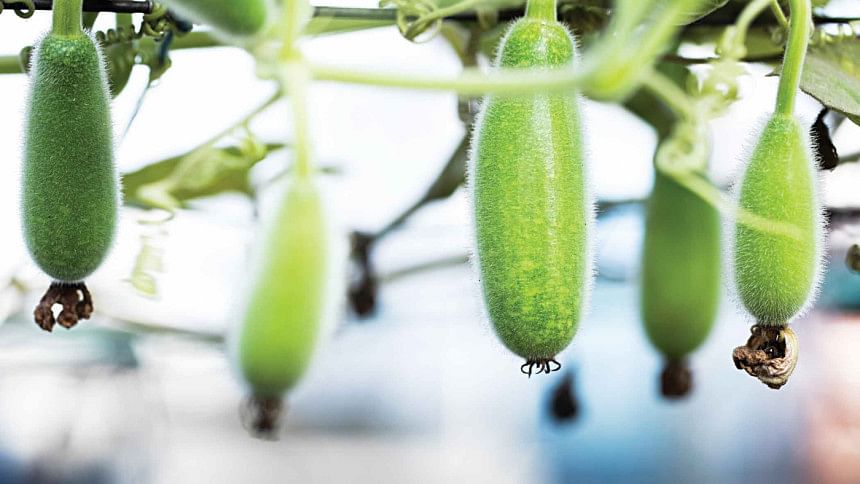The era of urban farming


Mujibor Rahman (not his real name), an expatriate living in the Middle East for the last 15 years, returned to his home-country in May last year due to the economic fallout in the country of his employmentand the subsequent termination of his job.
Rahman, already in his late 50s, worked as a cashier at a local restaurant in Jordan. After returning to Bangladesh, he was struggling to find a job in a similar position, because of the downward fluctuations in the job market, affected heavily by the pandemic. However, the predicaments didnot stop Rahman from moving on with his life. He didnot let the interruptions depress him, but rather he took the initiative all by himself to start a business on his own, based on the little piece of land that he owned at the peripheries of the mega-city, concentrating mostly on organic farming, poultry rearing and biofloc fish farming on leased land.
Today, Rahman is no longer struggling and earns enough to put food on the table and let his children study in respectable schools. This is one story amongst thousands who have concentrated on urban farming as the new method to earning a living.
According a BBS report (Bangladesh Bureau of Statistics and Informatics Division Ministry of Planning, Population Monograph, Volume 12), the growth of the urban population rate is higher in Bangladesh compared to the rate of natural increase in overall population. Amongst the many reasons given, selected few have been highlighted here like the natural growth of the urban population, emigration of population from the rural areas to the urban areas due to socio-economic reasons, and finally the changes in the definition of urban areas.
Based on another report by The World (Global News Program, September 08, 2010 issue), Dhaka is considered as the fastest growing megacity in the world, with a projection to becoming 20 million plus by 2025, which is larger than Mexico City, Beijing, or Shanghai.
All these numbers help to underscore the necessity of urban farming to prevent food shortage for the ever-growing urban population of the country. Speedy and unplanned urbanisation is causing urban poverty to increase and hence as a result the food security is decreasing, the biodiversity is decreasing, the green areas are disappearing, the climate conditions are worsening, and this is only the beginning of a long list of causative effects.
If we take this knowledge a bit forward making it relevant to SDG2, (Sustainable Development Goal 2) set by the United Nations in 2015 –– aiming to achieve 'zero hunger,' 'food security,' 'improved nutrition' and 'sustainable agriculture'; and to meet all the criteria especially that of 'food security,' meaning people at all times will have the physical, social, economic access to sufficient, safe and nutritious food irrespective of class, gender or region ( World Food Conference, 1974), urban farming becomes the ultimate logical solution.
Ashna Afroze, proprietor of Prakriti Farming, an institution that largely deals with community farming and urban farming solutions, agrees with us on this note.

"Sustainable urban agriculture can help largely in the mitigation of the shortage of food and assurance of food security," she said.
Afroze added on to present a clearer picture, "Rooftop farming is a successful concept in Singapore and Bologna, Italy – with almost 12500 tonnes of vegetables growing in the rooftops meeting the demand of atleast 72 percent of the residents' requirements. This is all over the Internet. If they can, why can't we…?" inquired the new-age agriculture entrepreneur.
Speaking to Afroze, we also learnt that FPMU (Food Planning and Monitoring Unit) have specified in a recent policy brief that the availability of farming land within Bangladesh is shrinking at an observable rate, which is a threat to the future of food security. Statistics such as these emphasise on the urgency of finding more space or new avenues to farming and hence urban agriculture can be a plausible solution to the posed difficulty.
Based on another report by the JUM (Journal of Urban Management, December 2017); urban gardening, mainly rooftop farming, helps to reduce the temperature of the roofs and the surrounding area contributing largely to the improvement of the local climate, helps reduce the island heat effect, and absorbs carbon emissions, improving the overall air quality of towns, cities and mega-cities.
Rain water and storm water is also captured, helping to reduce the chance of overflowing infrastructure, increased biodiversity, improvement of public health, etc.

The same report also suggests that Dhaka, the mega-city currently has around ten thousand hectares of rooftop space, which can be brought under rooftop farming helping the residents of the city taste fresh vegetables.
Afroze also added to the research, "Everything discussed till date is factual. Everything seems to be positive based on our discussions but to actually get the true picture, we must also look to the challenges."
And just to get closer to the idea, and find out the extent of the difficulties, we spoke to Tani Masud and Masud Ahmed, an elderly couple who have turned their rooftop into a farming haven.
"There are many factors that need to be considered before taking rooftop farming seriously; however, these factors are not too bothersome. A little bit of dedication can do wonders! The problem that we personally addressed right at the beginning was structural, and we had to increase the capacity of the roof to ensure it could take the extra load. A second problem that we faced was with keeping the soils healthy, as rooftop soils are different from ground-bed soils," Ahmed revealed.
His wife, added on useful pointers, "At first, I was a bit sceptical, didn't know the As and Bs of gardening. Then we took the help of experts like Prakriti Farming, who taught us the proper way of rearing plants and today I can do everything on my own. I began with guava first and this has ultimately led me to rearing vegetables from egg plant, tomatoes to capsicum and cabbage. I am quite satisfied with my gardening skills and mostly use what is produced on my rooftop," revealed a proud rooftop-farming enthusiast.
"To make the culture more sustainable the government can help us in this sector by making rooftop farming compulsory in the BNBC (Bangladesh National Building Code), then this process will no longer be alien to us," she concluded.
And finally, based on our research, we could say that rooftop farming, if implemented properly could certainly make contributions to the growing demand for food, and ultimately save adecent share of the household budget.
Based on a report by The Financial Times, January 2021, DNCC (Dhaka North City Corporation) Mayor Md Atiqul Islam has already announced that city corporation would provide 10 percent holding tax rebate for rooftop gardening.
With all calculations, pointing to the positive, the future for rooftop farming only looks bright.

Photo: Sazzad Ibne Sayed
Special thanks to Ashna Afroze, proprietor Prakriti Farming, for helping with the development of the report. And to Tani Masud and Masud Ahmed for taking part in the interview and allowing us to take pictures of their rooftop garden.

 For all latest news, follow The Daily Star's Google News channel.
For all latest news, follow The Daily Star's Google News channel. 



Comments